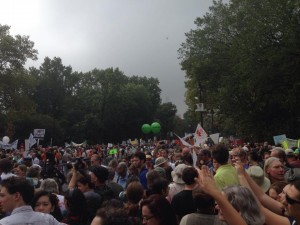I am an Associate Professor in the Mathematics and Computer Science Department at Queensborough Community College, and I have spent the last six years working on improving remedial mathematics.
When I started at QCC in 2007, students either placed into a semester long elementary algebra course, or a semester long arithmetic course after which, if they passed, they were required to take the elementary algebra course. The majority of students coming to QCC placed into one of these courses. Success rates were very low – for example only 3% of students placing into arithmetic graduated with an Associates degree within six years, only 10% of them even exited remediation, and in general passing rates in elementary algebra were consistently 35-40%.
I have been involved in several evidence-based reforms to address the low success rates of students who place into remedial mathematics. Each step the changes have been directed by a growing body of peer reviewed research, and by careful analysis of local statistical data.
In 2009 the QCC math department created a compressed 4-week, 20-hour version of the arithmetic course. This course was successful in the sense that students passed at a much higher rate, despite having the same curriculum and exit requirements as the traditional course. However, later analysis revealed that these students weren’t passing elementary algebra at a greater rate than before. The arithmetic course(s) seemed mainly to serve as an obstacle to student success. In Spring 2013 the department voted to eliminate the arithmetic course completely for a variety of reasons.
Together with my colleagues G. Michael Guy and Karan Puri, we studied the effect of the course elimination and found that students who would previously have placed into arithmetic were not adversely affected in the rate at which they passed elementary algebra. This study has been published in MathAMATYC Educator.
Of course, we are under no illusion that we have magically solved the issue of weak arithmetic skills in some of our students, but we believe that an arithmetic course is not the solution to this issue. Students, who learn an arithmetic skill in one course, aren’t likely to remember it 4-6 months later when it’s required in algebra if they weren’t given a context in the first place.
However, whether students take arithmetic or not, exit rates from remedial mathematics at QCC remain disturbingly low in the 35-40% range. In an attempt to address thiswe wrote an elementary algebra book in which we contextualize arithmetic skills and introduce them “just in time”. For example, we start with linear equations, which only require positive integer operations to solve, then review signed numbers, and then move on to linear equations with negative number operations. Initial results have been promising, in a study involving six instructors using this textbook students were nearly twice as likely to pass the course as opposed to a control group taught be instructors using the standard departmental text.
Our emphasis is on rethinking pedagogy and using time more effectively for student centered problem solving rather than shifting the issue to a lower course.
My research, supported this year by a Chancellor’s Research Fellowship for Community Colleges, will focus on these questions:
- How do students who would have formerly been placed into arithmetic perform in their credit math course(s)?
- How do students who take remedial algebra in classes with our contextualized textbook and student centered problem solving pedagogy perform in subsequent credit math course(s)?
- How do various attributes and attitudes influence student success, and what can we do inside and outside the classroom to support those which have a positive effect, and change those which have a negative effect?






